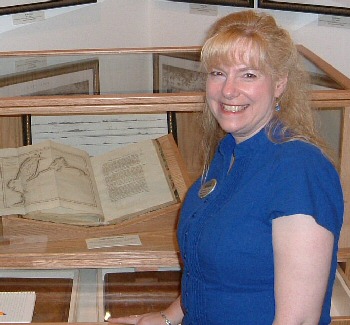|
New Research Into National Maritime Charity to Shed Light on Shipwreck Survivors

A major research project has been
launched into the 175 year history of national charity the Shipwrecked Mariners'
Society.
Dr Cathryn Pearce, Research Fellow in the Lifesaving and Shipwreck Group, at the
University of Greenwich, has begun an eight month project looking into the
history of the Society as part of a planned investigation into lifesaving and
coastal communities around Britain between 1700 and 1914.
Commodore Malcolm Williams, Chief Executive of the Shipwrecked Mariners'
Society, said he is delighted that Cathryn is taking the time to go through the
archives to shed further light on the historical work of the Society.

Malcolm explains:- "Losses from
shipwrecks in the 19th Century were staggering. In 1859; a particularly bad
year; 1,416 British owned merchant ships and fishing vessels were lost around
Britain's coast and with them 1,645 lives. In 1882, a more typical year, only
445 vessels were lost! Typically in the middle years of the 19th Century the
Society would be helping 12,000 to 13,000 people every year, including 8,000
widows, orphans and aged parents and 4,000 seafarers. Fortunately the Society
doesn't deal with shipwrecks on the scale it used to, but our work remains as
important, providing financial support to those in need, albeit in a much
changed world. While our name is now more of a metaphor for what we do sadly we
still deal with losses at sea, usually of single manned fishing vessels."
Dr Pearce said the idea for the project came out of her doctoral research, which
was ultimately published in 2010 as:- 'Cornish Wrecking, 1700 to 1860 -
Reality and Popular Myth.'
On the project, she commented:- "After the research I began to ask
questions about lifesaving and communities, such as what happened to the victims
and how were they cared for? How did those communities cope with shipwreck
victims who landed on their shores and the loss of their own menfolk? And what
was the role of the charities, as opposed to that of the Coastguard and other
governmental agencies?"
This led Dr Pearce to the Shipwrecked Mariners' Society, which was founded in
1839. The Society provided financial assistance to the widows and families of
fishermen and mariners who were lost at sea while for survivors it offered
clothing, food, accommodation and paid for travel home.
She continued:- "Initial research is bringing to light the sheer number of
shipwrecks that occurred yearly on Britain's shores in the 19th century and the
need for assistance that ensued. In 1860 alone, for example, the Society helped
7,247 shipwreck victims, both British and from overseas. The Charity's
impressive history highlights the importance of public giving, philanthropy and
humanitarianism that began in the nineteenth century and which continues to this
day."
Dr Pearce will be sharing her research with fellow academics, the Shipwrecked
Mariners' Society and local historians, as well as with the general public, in
the hope that it will raise even more awareness of the Society's work both today
and in the past.
The research into the Society's archives is being funded by Greenwich
University, with a view to securing additional funding from the Art and
Humanities Research Council for the larger project.
Nowadays, the Society's primary purpose is providing financial support to
retired seafarers struggling to make ends meet or who are of working age but
unable to work due to ill health, an accident or for compassionate reasons. Last
year, the Charity helped in over 2,200 cases of need amounting to an expenditure
of £1.4 million. It received over 600 new applications for assistance.
To find out more about the Charity, visit:-
ShipWreckedMariners.Org.UK or find
them on
Facebook and on
Twitter.
|
